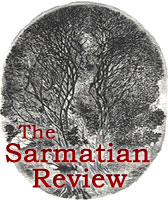| This Issue | Back Issues | Editorial Board | Contact Information |

Necessary Lies
Reviewer: Andrzej Karcz
Necessary Lies
By Eva Stachniak. Toronto: Dundurn Press, 2000. 265 pages. ISBN 088924295X. Paperback. $19.95.
Stachniak's first novel interestingly suggests how people's lives are sometimes mysteriously linked with historical events, be it recent developments or the more remote happenings of the past. The plot centers around a young Polish woman named Anna, and the time of action is the Solidarity period of Polish history. In 1981, when Solidarity was outlawed by the government of Soviet-occupied Poland, Anna decided to emigrate to Canada. At first, she planned to stay in Canada for the duration of her academic scholarship only, but soon she became enchanted by "Canadian comfort. . .supermarkets overflowing with food. . . the glittering lights of Montreal office towers." Along with Anna's Canadian enchantment comes her new love for William who teaches music at McGill University. After a brief romance, she decides to divorce her husband Piotr whom she had left in Poland, and marry William. This is the turning point. All that follows is a consequence of Anna's decision to marry William who turns out to be unfaithful to her.
But the novel's turning point is also its weakest point, as the reader is presented with little justification for Anna's decision about divorce and remarriage. Granted, Anna did not like communist Poland, but her marriage to Piotr was a happy one. Why, then, does she divorce him? The detailed descriptions of Anna's getting to know Piotr, their courtship, romance and marriage are convincingly presented, but her acquaintanceship with William, who happens to be a German Canadian, seems shallow and a bit too sentimental.
But Necessary Lies is ultimately not about romancing. It is also a deft analysis of individual lives intertwined with history and politics. Anna's life in Poland is depicted as that of a person submerged in political events. Through Piotr, she became involved in clandestine anti-communist activities. The events of 1968 and 1981 were part of Anna's biography. Also, Stachniak's brings to bear events of World War II in Poland and Germany. She presents her characters against the background of war and postwar history of the city of Wroclaw. Anna was born in that city (an autobiographical element, perhaps), and when she meets William, she learns that he is a Canadian born in Germany in 1940, when Wroclaw was still called Breslau and belonged to Nazi Germany. William lived in that city with his mother until the war's end. In their mutual remembrances, Wroclaw and Breslau turn out to be worlds apart. Anna learns countless stories, among which there are many lies, about that city and its history as present in German memory.
There are also lies in Anna's life. When William dies suddenly after ten years of marriage, Anna discovers his secret love letters from a German journalist Ursula. She painfully learns that her husband had a love affair that lasted throughout her marriage. This devastating discovery makes Anna go back to Wroclaw and confront her own personal past, and also to confront her late husband's past by visiting the house in which he lived as a child. She also arranges to meet William's lover Ursula who resides in Berlin. Anna's confrontations become powerful history lessons. After ten years of absence, she not only sees her own country as a new Poland liberated from communism, but she also learns about her own family in this new reality. She is able to look into her parents's past as well (having survived the war, they moved to Wroclaw). She also looks into the past of her late German husband's family who abandoned the defeated Breslau. She meets a close friend of William's mother and discovers that his father was a Nazi, while his grandfather was executed by the Nazis. The pieces of the puzzle of the two families' lives and one city's war history are being arranged before Anna by fate. Anna's history lessons become her own scars and wounds, and she very intimately experiences the turmoil of twentieth-century European history.
Necessary Lies is set in Montreal, Wroclaw, Berlin, and Warsaw. These city names, together with the years "1981" and "1991" added to them, serve as titles for individual chapters of this well-constructed novel. One stylistic feature might annoy some readers: the use of Polish and German words or phrases followed by their English equivalents. These multilingual additions detract from readability of the text.
Back to the September 2001 issue
The Sarmatian Review
sarmatia@rice.edu
Last updated 9/17/01